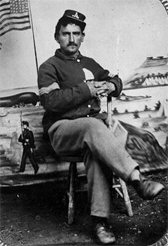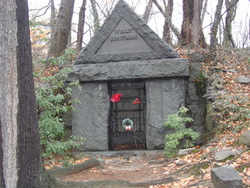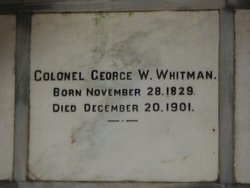Notes for GEORGE WASHINGTON WHITMAN:
Son of Walter and Louisa (Van Velsor) Whitman, Sr.
Born: November 28, 1829 in West Hills, Huntington Township, Suffolk County, Long Island, New York.
Died: December 20, 1901 in St. Louis, Missouri.
Buried: Harleigh Cemetery, Camden, Camden County, New Jersey.
Military Service: Union Army; had a distinguished career as a soldier and left the service as a lieutenant colonel; George is a Civil war Colonel who was wounded in action at the battle of Fredericksburg.
Married: Louisa Orr Haslam April 14, 1871 in Unknown.
Exactly a week after the firing on Fort Summer on April 12, 1861, George Washington Whitman enlisted as a hundred-days' soldier in the Thirteenth Regiment of the New York State Militia. In September of that year he re-enlisted this time in the Fifty-First Regiment of the New York Volunteers. After George survived the Battle of Antietam on September 17, 1862, he wondered why "Uncle Abe has issued a proclamation declaring the slaves free in all the States that are in rebellion." At the same time, southern or border states that had not rebelled could keep their slaves, as Lincoln, in the Emancipation Proclamation of January 1, 1863, was to free slaves in every place except where he had the actual authority to do so. On December 16, 1862, the Whitman household at 122 Portland Street, near Myrtle Avenue in Brooklyn, got its first indication that Union Colonel George Washington Whitman had been wounded at the Battle of Fredericksburg, a ferocious defeat by General Ambrose Burnside's Federals by General Robert E Lee's Confederate Army of Northern Virginia. By the end of the war, George Whitman was the only member of his regiment who had started out with it back in the fall of 1861; the rest were either killed, wounded, sent home at the end of their three-year enlistments, or - in relatively few cases- transferred to other military units. Upon hearing that his brother George had been wounded, Walt Whitman hastened to Virginia and remained as a voluntary aid and nurse in the army hospitals there and in Washington, D.C., from 1862 to 1865. George, along with almost his entire regiment, was surrounded and taken prisoner at Poplar Grove Church, Virginia on September 30, 1864. He almost died in Libby Prison in Richmond before becoming part of a general prisoner exchange on February 22, 1865. When the Fifty-First Regiment of New York Volunteers finally disbanded, he had participated in the Grand Review march through Washington and been promoted to breveted Lieutenant Colonel. One of the primary reasons that Walt Whitman moved to Camden, New Jersey late in life was that his brother George was living there at 322 Stevens Street working as a pipe inspector starting in 1869. By the time of Colonel Whitman's death in 1902, he was rather prosperous. His estate contained bank accounts totaling almost $60,000. Though much admired by his brother Walt, George showed little or no interest in his brother's literary life.
Civil War Union Army Officer. Ten years younger than his famous poet brother, he was born in Brooklyn, New York. In 1834 he moved with his parents Walter and Louisa and his siblings to Long Island, New york. In "My Boys and Girls" Walt Whitman remembers happy boyhood times when he carried his brother on his shoulders, "his legs dangling down upon my breast, while I trotted for sport down a lane or over the fields" George received his basic fundamental education from his lauded older sibling when Walt was the local schoolmaster.Later, he was trained in carpentry by his father and worked alongside his brothers Andrew and Walt in the family trade of building houses. In 1885 George was quoted as saying about his brother's famous work "Leaves of Grass": "I saw the bookódidn't read it allódidn't think it worth reading..." Named after America's first president, George lived up to the legacy of patriotism when he responded to the Rebel attack on Fort Sumter by joining the local militia, The 13th New York, in the spring of 1861 and then enlisted that fall with the 51st New York Volunteers and served until the end of the war. After George was injured by shell particles to the jaw during the Battle of Fredericksburg, his older brother rushed to his side to nurse him back to health. The experience inspired Walt Whitman to write many famous poems and letters and continue to volunteer to aid the troops. In "Specimen Days" George Whitman's battleground heroism at New Bern, Antietam, Fredericksburg, Second Bull Run, the Wilderness, and Petersburg wwere recounted for posterity and also reflected in the stripes (sergeant, captain, major, breveted lieutenant colonel) he successively earned during his military service. After the war, George Whitman returned to Brooklyn. He obtained work inspecting iron pipes in Brooklyn and Camden, New Jersey. He married Louisa Orr Haslam on 14 April 1871 and settled in Camden. A year later, he moved his ailing mother and retarded brother Edward in with them. When Walt Whitman suffered a debilitating stroke in January 1873 and went to George's home to convalesce. The brothers lived amicably together. George and Louisa named their first son, who died in infancy, after Walt. (A second boy, named for his father, was still-born.) George worked the rest of his life as a pipe inspector for the city of Camden and the New York Metropolitan Water Board. In 1884 George and Louisa moved into a new house they had built on a small farm outside Camden. The separation of the brothers caused a permanent rift. Cause of death- natural causes. (Souce: R. Digati)


